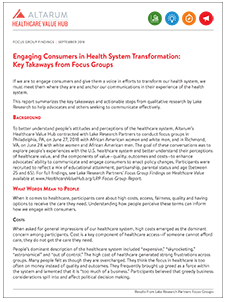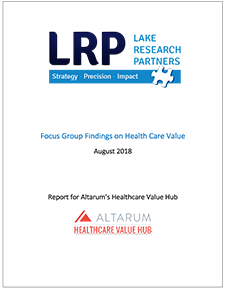Engaging Consumers in Health System Transformation: Key Takeaways from Focus Groups
If we are to engage consumers and give them a voice in efforts to transform our health system, we must meet them where they are and anchor our communications in their experience of the health system.
This report summarizes the key takeaways and actionable steps from qualitative research by Lake Research to help advocates and others seeking to communicate effectively.
Background
To better understand people’s attitudes and perceptions of the healthcare system, Altarum’s Healthcare Value Hub contracted with Lake Research Partners to conduct focus groups in Philadelphia, PA, on June 27, 2018 with African American women and white men, and in Richmond, VA, on June 28 with white women and African American men. The goal of these conversations was to explore people’s experiences with the U.S. healthcare system and better understand their perceptions of healthcare value, and the components of value—quality, outcomes, and costs—to enhance advocates’ ability to communicate and engage consumers to enact policy changes. Participants were recruited to reflect a mix of educational attainment, partisanship, parental status, and age (between 25 and 65). For full findings, see Lake Research Partners' Focus Group Findings on Healthcare Value, available here.
What Words Mean to People
When it comes to healthcare, participants care about high costs, access, fairness, quality, and having options to receive the care they need. Understanding how people perceive these terms can inform how we engage with consumers.
Costs
When asked for general impressions of our healthcare system, high costs emerged as the dominant concern among participants. Cost is a key component of healthcare access—if someone cannot afford care, they do not get the care they need.
People’s dominant description of the healthcare system, included “expensive,” “skyrocketing,” “astronomical,” and “out of control.” The high cost of healthcare generated strong frustrations across groups. Many people felt as though they are overcharged. They think the focus in healthcare is too often on money instead of quality and outcomes. They frequently brought up greed as a force within the system and lamented that it is “too much of a business.” Participants believe that greedy business considerations spill into and affected political decision making.
They generally focus their initial blame for high prices on the government. They think of politicians who have better care than the average person, bring up efforts to repeal ACA, and think about politicians placating special interests ahead of the people. But, after people get past their initial reactions, many blame industry—pharmaceutical companies, insurance companies, and hospitals—and the drive for profits as the chief driver of high prices.
Access
People care about access to healthcare. As mentioned above, cost and access are highly related, and cost is often a determinant of access. But access is also a function of logistics; being able to make the time to get to an appointment and having the transportation to get there, having internet access to learn about healthcare options and make appointments, speaking English well enough to understand materials, being eligible for a health plan at work or through a spouse.
The complexity of healthcare and the challenge of navigating information from insurance companies, health providers, doctors, and others frustrated nearly all participants. Many people cited the complexity of selecting the right insurance plan for their needs, comparing benefits across plans, and sorting through what treatments their plans cover as examples that cause frustration.
“I don’t have a personal concern, but I think it’s not fair and not equitable that some people don’t have access to certain providers as a result for limited options for healthcare and things like that.” —African American woman, Philadelphia
“I would say even understanding the healthcare industry because a lot of people don’t even understand.”—African American man, Richmond
“Just the ability to navigate the system.”—white woman, Richmond
Fairness
When thinking of our healthcare system, fairness was an important term that resonated across all groups. Participants were aware of, and dismayed by, systemic inequities and disparities regarding who has access to quality care. They spoke about how money can buy quality which leaves those without resources with subpar care. Throughout the discussion, African American respondents brought up their feeling that there are structural barriers that make it harder for African Americans to access quality care at the same level as whites.
“I say for me fairness means equal treatment and access to available medication regardless of your ability to pay.” —African American man, Richmond
“I feel like a lot of low-income families are targeted in this kind of system.” —white woman, Richmond
“When it comes to health care, everybody should be treated equal. Nobody should be turned away.” —white man, Philadelphia
Quality
Participants spoke about quality in several dimensions. They considered good quality as a function of how much time and attention they receive from their provider. They want to be able to engage in trusting relationships with doctors and other medical staff. They want to be listened to, to be heard. For some participants, accuracy, equality and cleanliness were aspects of quality. As the term is commonly understood in the policy world, quality also meant good outcomes, that after seeking care from a doctor or healthcare provider one’s health improves.
Participants perception of healthcare quality was broader than a provider’s clinical efficiency. It included personal experience with providers, with quality providers described as taking time to listen to their needs or whether it’s easy to get an appointment.
“[Quality] is about outcomes. If it is not improving your health, it doesn’t matter how much it costs.” white man, Philadelphia
“Quality means a high degree of competence.” —African American man, Richmond
“It is a high degree of caring.” —African American man, Richmond
Options to Ensure Access to Quality Care
People want options, primarily to ensure they have access to quality care. They want to choose their doctors, and they want their doctors to be able to choose the right course of care for them and be free from potential constraints by insurance companies or influence from pharmaceutical companies.
Healthcare Value
Lake Research explored perceptions toward terms that combined the concepts of cost and quality in the context of healthcare. “Value” had many different meanings to people. While participants cared deeply about costs and quality of care, they did not conceive of value in the way policymakers do, as the relationship between the cost and health outcomes of treatments.
The term “healthcare value” did not resonate with people when thinking about healthcare. Participants came up with some alternatives to value, but nothing emerged as a dominant phrase to replace the concept of healthcare value.
Healthcare System Needs to Change
Distressingly, but not surprisingly, participants were not satisfied with the health system we have. Even if their health was good now, even if they had good health coverage now, they described themselves as “lucky”—and feared a change in those circumstances. They were acutely aware of others who weren’t faring as well and wanted the system fixed so that the system is fair to all people.
Participants felt that too often the focus in healthcare is on money instead of quality or outcomes. People used moral language to describe their frustrations with the system: “lack of integrity,” “a racket,” and “greedy.”
People generally had negative reactions when asked what they think about “health providers, doctors, and insurance companies.” Some distinguished between stakeholders on the business side (providers and companies) and those on the care side (doctors), with the business side of healthcare having a negative connotation. When people discussued pharmaceutical companies they described them as greedy, with incentives that prioritize profit over care.
“Overcharged. There is a term Affordable Health Care, but it seems like since I have been paying for my own healthcare nothing has really been affordable about it. And the price of the insurance goes up every year it seems and the prices of healthcare itself goes up all the time. Prices aren’t going down. They are going up.” —African American man, Richmond
“I put greedy. Doctors and drug companies are out to make money. Dysfunctional, unfair. It is profitable to a selected group of people. It’s broken. It’s unjust. t’s not user-friendly, and it is basically a privilege. The more you have the better health care you get.” —African American man, Richmond
“I think lobbyists own this healthcare system. I really do.” —white woman, Richmond
Views Toward Solutions
Despite their concerns with politics and special interest influence in politics, they looked toward legislation for solutions.
People had mixed reactions to the word “regulation” in general, but they favored state regulations in healthcare so long as they improve health outcomes and protect consumers. The term “health regulations and laws” was sometimes perceived of in the context of insurance, such as HIPAA or the amount of their copays. The term also brought up concerns about transparency. Participants were generally OK with regulations in healthcare, but they want to know who is writing the rules. This is an area where there was strong concerns about policymaker intentions and the ability of the healthcare industry to manipulate rules in their favor.
Participants may have been somewhat suspicious of regulations in general, but when given a set of specific solutions—such as protections against surprise medical bills, insurance rate review and drug price transparency—they were much more supportive. When given examples of solutions that states have proposed or implemented, people questioned why these have happened in some states but not all. They assume that it has to do with politics interfering with adopting important solutions; concerns that politics and lobbyists stand in the way of enacting solutions. They didn’t think it's fair that states can differ from one another.
Their favorite solutions involved protecting consumers from surprise medical bills and making pharmaceutical companies justify price increases. They viewed these solutions as putting people and patients first, ahead of financial considerations.
To many participants, making healthcare free emerged as a critical solution, or at least affordable by income level. They recognized the political barriers to this but see no other way to address the most broken part of the healthcare system. Faced with the complexity of the healthcare system, the simplicity of making it free for everyone has appeal.
Personal Role in System Change
Participants identified two steps individuals can take to help address frustrations with the health system. First, people can focus on themselves, making healthier decisions and taking care of themselves, and become more knowledgeable about the health system. Second, people can interact with others to increase awareness and become more politically active by voting for legislators that they believe will make improvements or talking to elected officials to influence policy changes.
Key Takeaways for Advocates
As confirmed by other studies, our focus group participants were frustrated and deeply concerned about high and rising costs, systemic inequities/lack of fairness, and being able to access the care they need. They wanted to see the healthcare system changed and expressed willingness to push for changes. This provides a strong basis for engaging consumers but there are messaging pitfalls to avoid, namely:
- “Quality” has a broad meaning for consumers—not just clinical quality but how they are treated by office staff, how much time they have with the doctor, and even the cleanliness of the facility.
- “Value” is NOT a term that can be used to convey the concepts of healthcare cost and quality at the same time; better to just use the component terms.
- “Health regulations” can be conflated with insurance plan rules, as opposed to rules that come from a state or federal regulator.
Efforts to engage consumers should anticipate cynicism with every aspect of the healthcare system and meet it with an approach that centers on people and consumers.
- Toward government: People believed politicians cater toward special interests like pharmaceutical and insurance companies. To counteract: When talking about solutions, focus on the outcomes for consumers.
- Toward business: People expressed discomfort with industry’s prioritization of profits over people’s health. To counteract: Stress the value of accountability in policy solutions geared toward insurance companies and pharmaceutical companies.
- Toward doctors: People worried that doctors have an incentive from pharmaceutical companies to prescribe certain drugs over others, and to prescribe drugs in general as a quick fix instead of thinking through a full range of care options or preventive care. To counteract: Stress the importance of ensuring doctors spend the time they need with each patient to provide them individual care.
- Toward solutions: People believed politics will get in the way; that special interests will block proposals that may harm their business. To counteract: Highlight solutions and offer success stories.
While participants wanted to see the system changed, they had only a modest understanding of who is setting the rules (the health plan, that state, the federal government) and they weren’t sure if new rules will be written with patients in mind. Conversations about change will have to address this distrust in institutions and instill confidence that any changes make consumers better off.








